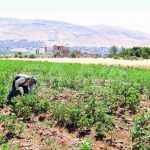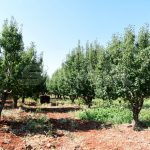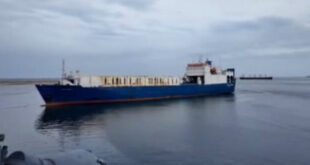Damascus, SANA- Damascus Countryside province is distinguished by the diversity of its agricultural production which includes different field crops, summer and winter vegetables and fruit trees of all kinds, in addition to the distinguished livestock with a good growth rate, which contributes to supporting the national food security.
According to Director of the Agriculture Directorate, Eng. Irfan Ziada, Damascus Countryside province is considered a major source for securing livestock and agricultural products to the city of Damascus and other provinces. However, the agricultural situation has deteriorated as a result of terrorism in a number of the province’s regions and as soon as security and stability has been restored to these areas, the governmental bodies concerned have started to provide the requirements of gradually bringing back the agricultural reality to its previous status.
Various types of support have been also provided to the components of the agricultural sector such as grass, seeds, fertilizers, fodder, fuel, electricity, repair of irrigation wells and providing facilities for the expansion of modern irrigation networks, Ziada added, stressing the return of 38,000 farmers to practice their agricultural activities in the province after liberating their areas from terrorism.
In a statement to SANA, Ziada noted that that agriculture is currently one of the most important components of economic development and the most important factor in economic resilience, pointing out that the bodies concerned are working to provide all necessary support to replant every cultivable meter, in addition to providing grants for family farming and seasonal crops, and helping farmers to restore their lands as green as they used to be.
He added that the agricultural area invested in Damascus Countryside amounts to 133 thousand hectares distributed among irrigated and rain-fed agricultural areas while the execution rate reached about 90 percent of the summer and winter crops, as the production of potatoes reached 40 thousand tons, meanwhile with regard to the fruit trees, the production of apple crops reached 140 thousand tons, cherries 50 thousand tons, apricots 13 thousand tons and olives 32 thousand tons.
Ziada asserted that Damascus countryside province constitutes an integrated food basket for Damascus province and the southern region, indicating that the received quantity of diesel fuel to support the agricultural sector in these areas meets 70 percent of the total need.
He hailed the facilitations provided by the government which are related to granting loans to farmers with simple interests, securing machines, enhancing water resources, and activating agricultural marketing, in addition to purchasing directly from farmers, establishing manufacturing units for agricultural products, and rehabilitating the destroyed centers of biological pest control.
Ziada stressed the implementation of what was agreed upon in the directorate’s plan for the current year of reinvesting every inch which can be cultivated in areas liberated from terrorism, reopening agricultural roads, and preparing a preliminary study in order to rehabilitate the damaged nurseries in the province and compensating for the trees cut by terrorist groups.
Ziada noted that the Ministry of Agriculture has provided all forms of support and facilitations necessary to reinvest agricultural lands and secure the necessary supplies and materials for farmers in all regions, pointing to securing water by opening irrigation channels, rehabilitating damaged wells, restoring electricity, providing fuel and other services that contribute to optimally investing agricultural lands. In addition, many technical, agricultural and veterinary services provided through the agricultural guidance units and veterinary centers in Damascus countryside.
He called on all the people in Damascus countryside to take the initiative to cultivate and invest their lands throughout the year and to rely on local production in light of the unilateral coercive measures imposed on the Syrian people due to the importance of agriculture at the economic and living levels, stressing the need to increase the amount of electrical energy needed for agriculture and secure subsidized fuel with sufficient quantities.
On the directorate’s plan and future vision, Ziada indicated that every investible inch of the public and private lands will be invested, in addition to preparing a plan for maintaining agricultural roads to secure farmers ’access to their lands easily and rehabilitating the center of biological pest control in the town of Beit Tema to produce natural enemies, as well as depending on the integrated biological control and reducing the use of pesticides to preserve the consumer health and the quality of the Syrian product and to protect the environment, indicating that SYP 200 million has been allocated as governmental support for that purpose.
Ziada pointed out that two nurseries for fruit saplings in Kharabou and Barada Spring have been rehabilitated to secure fruit saplings for farmers for symbolic prices to reforest the areas ravaged by terrorism throughout the years of war with about 3.5 million trees within a 3-year plan at a cost of SYP 500 million and with a governmental support.
Ziada pointed out that a number of buildings belonging to the Directorate that were destroyed by terrorism had begun to be rehabilitated and provided with the technical staff to participate in the technical, guidance and veterinary support to the peasants, in addition to establishing a market for rural women’s products in the town of Moadamiya in Damascus countryside at a cost of SYP 200 million, and it is expected to be completed by the end of this year along with continuing the family farming project and relying on small productive projects in the countryside.
Ruaa al-Jazaeri
 Syrian Arab News Agency S A N A
Syrian Arab News Agency S A N A





